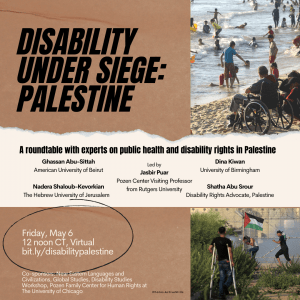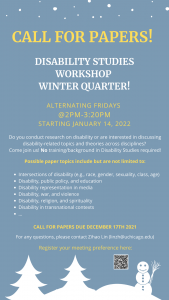DISABILITY STUDIES WORKSHOP WINTER 2022 SCHEDULE
Fridays | 2:00PM-3:20PM (CST) on Zoom (unless otherwise noted)
Mark your calendars and RSVP here!
January 28th – Joint Session with The Research in Art and Visual Evidence (RAVE) Workshop
–
“My practice is staying alive”: Critique and care in the sculptures of Emily Barker
–
Brandon Sward, Ph.D. Candidate, Department of Sociology, University of Chicago
–
This chapter focuses on two recent projects by artist Emily Barker entitled Built to Scale and Moving Parts. While in the former Barker created an immersive installation to replicate some of the embodied experiences of wheelchair users, with Moving Parts Barker converted a recreational vehicle into an accessible live-work space as a response to the ways in which ableism is embedded in the built environment, aspects of which had been previously made visible in Built to Scale. By bringing Barker into conversation with concepts like art historian Julia Bryan-Wilson’s “occupational realism,” wherein the living of life itself is presented as a work of art, and architect Yona Friedman’s “mobile architecture,” wherein buildings respond to the shifting needs of their occupants, this chapter explores how the world Barker envisions could benefit both the able and disabled and how art can provide a space to engage these collective imaginings.
–
Discussant: Sila Ulug, Ph.D. Student, Department of Art History, University of Chicago
–
February 4th
–
Criminalization, Medicalization, and Responsibilization: A Critical Examination of Mental “Health” in Criminal-Legal Diversion Contexts
–
Brianna Suslovic, Ph.D. Student, Crown Family School, University of Chicago
–
Mental health courts offer an alternative to incarceration that converges upon defendants with diagnosed serious mental illnesses. In doing so, their diversion programming reifies medicalizing and criminalizing discourses, reading treatable illness onto body-minds that have been construed as deviant. The discourses of recovery and health in these contexts create logics of care and recovery that often overshadow the logics of social control in these so-called problem-solving courts. Expanding upon Liat Ben-Moshe’s scholarship on incarceration through a disability lens, this conceptual paper articulates several critiques of existing norms and discourses of mental health courts. By developing a disability-informed framework for the category of serious mental illness, this paper raises questions about care, control, and discrimination in this setting. As a central organizing category for mental health courts, the label “serious mental illness” facilitates a flattening of lived experiences, forcing a predetermined narrative of illness and recovery onto individuals whose experiences of disability may not fit within that linear model. By articulating psychiatric disability as a category of analysis, this paper facilitates further exploration of institutional violence within carceral contexts such as mental health courts. The paper engages existing literature on compliance and engagement in mandated treatment to highlight the limitations of a health- or recovery-focused response to harm in these court settings. The paper closes by advancing an abolitionist model of care and responses to harm, arguing that a radical departure from existing modes of punishment and treatment is required.
–
Discussant: Michele Friedner, Associate Professor, Department of Comparative Human Development, University of Chicago
February 9th (Wednesday, 4:30-6 pm CST) – Joint Session with Medicine and its Object Workshop
Ethnographic Betrayals: Secrecy, Loyalty, and Sovereignty in the Field
Salih Can Açiksoz (guest speaker), Faculty UCLA, Anthropology
Defined by the global surge of the far-right and populist authoritarian leaders, our world-historical moment is flooded with political discourses of betrayal. What does a global political climate pervaded by the many senses of betrayal and treason say about the practice and horizon of anthropology? In this article, I use my fieldwork with the ultranationalist disabled veterans of Turkey’s Kurdish War as a window into thinking through how betrayal can help us spell out the practical, ethico-methodological, and political challenges faced by ethnographers, particularly those working on the far right or under conditions of political violence. Extending the discipline’s methodological debates beyond a focus on the dyadic relation between the ethnographer and the research subjects, I show how ethnographic betrayals are circumscribed by the work of sovereignty and the law.
Discussant: Eman Elshaikh, Ph.D. Student, Department of Anthropology, University of Chicago
February 11th (CANCELLED)
–
Prison Schooling and DisCrit Abolitionist Imaginary
–
Subini Annamma (guest speaker), Faculty Stanford, Education
–
Discussant: TBA
–
February 25th
–
Opening Hearts and Minds; Becoming a Hà Nội Sign Language Interpreter
–
Aron Marie, Ph.D. Candidate, Department of Comparative Human Development, University of Chicago
–
In the few cases where the early development of sign language interpreting has been documented, the first interpreters generally have pre-existing relationships with deaf people, either through kinship (children of deaf adults CODAs being some of the most common early interpreters), or professional ties (teachers or ministers of the deaf). However, in Hà Nội, Việt Nam, despite interpreting being in its very early stages, the majority of sign language interpreters have no prior connection with deaf signing people before they decide to take a sign language class. In this chapter, I detail the process of becoming an interpreter, examining the way deaf leaders recruit interpreters who can assist with their political project, opening their hearts and minds to the deaf community. I examine the process of becoming an interpreter as a deeply transformative process, whereby novice interpreters radically change their attitudes and beliefs towards deaf people and become embedded in deaf social networks, often to the point where they maintain little to no contact with hearing non-signing friends. The chapter examines what it means for interpreters to belong to the deaf community; arguing that for hearing interpreters in Hà Nội belonging to the deaf community is an all-consuming yet precarious task. I examine how the project of belonging to the deaf community sits in tensions with other forms of belonging Vietnamese women are normatively expected to engage in, and the way the all-consuming nature of belonging to the deaf community makes the experience of leaving the deaf community a profound sense of loss.
–
Discussant: Ashley Drake, Teaching Fellow, Social Sciences, University of Chicago
–
On Liveliness and Participatory Dwelling: Blind Russians’ Building Their Own Home
–
Svetlana Borodina (guest speaker), Mellon Teaching Fellow, Harriman Institute, Columbia University
–
In this talk, I set out to explore the perceived and cultivated liveliness of blind activists in Russia, as well as their work to encourage the formation of lively communities based on participatory dwelling. On the one hand, I am interested in how specific actions and activities of blind people and their sighted allies in Russia facilitate the interlocking between individual and social liveliness as well as provoke individual reckoning about people’s existential and social participatory abilities and obligations. Through linking the individual quality of being lively to the social atmosphere—and expectations—of liveliness, my blind interlocutors change broader cultures of civic participation and social attitudes toward people with disabilities. Here lies my other interest. Namely, I explore the attractiveness of this individual and collective liveliness (organized and cultivated by blind activists) to abled Russians. Specifically, I analyze how the inclusion programming of the Russian blind activists connected to the broader grammar of civic action and intervention that emerged in the mid-2010s in Russia. Through coalitional practical action focused on the improvement of community life for all, people without disabilities were converted into routine allies who would allocate their time and resources to building the world they live in, to tending to it, and dwelling in it. Through this serial engagement, people with and without disabilities cultivated themselves as subjects capable of participating in building own – populated and communally shared – world.
–
Discussant: Zhiying Ma, Assistant Professor, Crown Family School, University of Chicago
–


